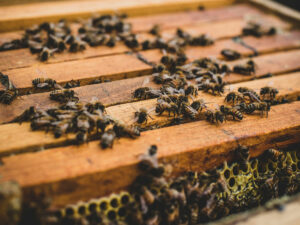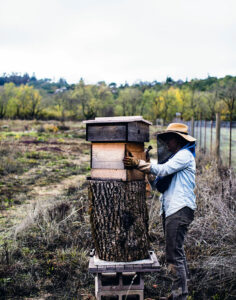
At the Aug. 7 meeting of the Healdsburg City Council, the first five speakers in the open public comment period had a common topic: honey bees.
Starting with Candice Koseba of Sonoma County Bee Company and ending with Michel Thiele of Apis Arborea, the speakers outlined a crisis that was threatening the health and genetic integrity of local bee populations: a commercial beekeeping operation that had just begun a three-year contract with Sonoma County.
The agreement, announced in February, was with Tauzer Apiaries of Petaluma to host up to 120 beehives seasonally on a portion of vacant county property adjacent to the Healdsburg Transfer Station, the county’s refuse disposal and recycling facility on Alexander Valley Road.

Less than a month later, the county’s Department of Public Infrastructure announced that the contract with Tauzer had been terminated with the required 60 days notice.
“I applaud the individuals who spoke up for letting us know that there was not just concern, but some true issues there,” said Supervisor James Gore, whose office pursued the public complaints with the county department. “I think it’s appropriate that our folks executed their right to terminate on the contract.”
High Hopes
When it was first announced, the three-year agreement with Tauzer Apiaries was publicized as a positive, environmentally positive program “to help local farms, orchards and gardens, while at the same time support a local business in its mission to enhance biodiversity in Sonoma County and throughout California,” as Board of Supervisors Chair Chris Coursey said at the time.
But for the local beekeeping community, Tauzer’s practice of “parking” their commercial hives on public land was anything but a positive step for the environment or habitat preservation.
At the Healdsburg City Council meeting, one after another, the speakers stated their case. “Healthy local backyard beekeepers and small operations like mine are robbed of their honey stores, stripped of their resources and made susceptible to disease brought in by these migratory bee operations,” said Koseba. “Migratory beekeeping is detrimental to the health of native hives and native pollinators, destroying local biodiversity.”
Christine Kurtz, who calls herself the “Petaluma Bee Lady,” outlined the limited five-mile radius of any colony of bees. The Tauzer installation overlapped many local, native hives to their detriment, she said. “Where there isn’t enough food available, colonies will rob each other. Robbed colonies will die or consequently starve,” Kurtz stated. Pests, parasites, disease and pathogens can be introduced, again to the detriment of native bees, she added.
The other speakers included Sierra Castillo of Pollen & Fox, and Joy Wesley, owner of Bee Focused. “I have observed several of my healthy hives get robbed to death within days of seeing new bees placed by migratory beekeepers in the surrounding area as they bring them in to ‘rest,’” said Castillo. “It’s a helpless feeling.”
‘Pollination Services’
Tauzer’s business is to provide bees to pollinate commercial crops, such as almonds, primarily in the Central Valley. Between pollination contracts, the bees are kept or “parked” in areas far from the orchards. Tauzer has a 200-acre Bloomfield Ranch property near Petaluma where they keep many hives, and they actively seek other “hive hosts” to keep honey bees that can provide “places to forage on diverse plants and flowers,” according to tauzerbees.com.
Trevor Tauzer, a second-generation beekeeper, responded to the recent public concern when contacted by the Tribune.
“While our management of our hives is different than what someone with a backyard hive will do, there is much more common ground than anything else,” he replied in an email. “I believe there is a healthy fear of what is happening in the natural landscape and the negative changes we are witnessing, but our business and activities in the region are not the problem.”
He continued, “We are providing pollination to farms and crops that are dependent on insect pollination. Without honey bees, our agricultural system in California would crumble. The importance of pollinators cannot be overstated.”
But Michael Thiele termed their arguments “greenwashing,” or using environmental language to mask an environmental concern. He recommended a 2013 documentary, More Than Honey, that shows “the dark side of commercial beekeeping.”

The rapid pivot by Sonoma County to terminate the contract with Tauzer drew approval from beekeeper Rob Keller of Napa Valley Bee Company. “Wow, for me to get that done over here, it took six months in multiple meetings, longer!” Keller noted. He said he and others had pressed their point with Napa County’s planning department and Napa City Council several years ago, and were able to put caps on such bee hive staging, though he said Tauzer had not been one of the businesses practicing in Napa County.
“One of my biggest complaints is high density,” said Keller. “Nothing’s worse than being responsible and aware of hive density and practicing good hive density and having one or two colonies at one location, and then someone comes in and drops 60 colonies directly across the street from you.”
Supervisor Gore said the county’s pull-back from the contract was the direct result of the public voices raised in Healdsburg. He admitted that when the county entered into the agreement with Tauzer, “They did it with full of good intentions. I mean, there was no economic benefit” to the county. The agreement called for a $5/year lease per hive; with up to 120 beehives seasonally on a portion of vacant county property, that adds up to only $1,800.
“The intent was in the right place, to try and use public lands to do public good,” Gore said, but once the contentious aspects of the arrangement came to light, the county was quick to reverse itself.
“This is just a stepping stone in our advocacy campaign towards a science-based, truly sustainable county ordinance,” said Thiele, whose Apis Arborea is devoted to the “rewilding” of honeybees.
The issue is not confined to Sonoma, Napa or the surrounding counties. An article in the Aug. 21 issue of The New Yorker, called “Hive Mind,” poses the larger question, “Is Beekeeping Wrong?”
“We disagree with characterization of our business and our bees’ presence on the county’s property, but ultimately we strive to strike a balance between our community and our interests, as we do with our bees and their environment,” said Trevor Tauzer upon the news of the canceled county contract.
Added Tauzer, “We cherish our partnerships and will continue to support the community we rely on to support the future of our food security.”









Great article. Much more information than anything written on this subject by the Press Democrat.
I was amazed that the county Board of Supervisors entered this agreement with Tauzer without doing any research at all.
While agriculture needs honeybees, Sonoma county should not become an off-season dumping ground for hundreds if not thousands of commercial bee hives
Very grateful for this decision. Glad the voices of local beekeepers were heard by Healdsburg City Council and by the Board of Supervisors!
Excellent article; local journalism at it’s best! Thank you for covering this important topic. It is so encouraging to see the Board of Supervisors re-examine an issue and act on their deeper understanding!